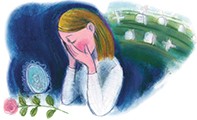Peer Reviewed
Psychological medicine
Dealing with loss and grief
Abstract
An anticipated death has effects on those dying and on those ‘shouldering the burden’. For example, a young adult facing death will have a sense of being cheated of life. He or she may be caught in a state of transition, having achieved so much that was meant to be a ‘springboard’ for the rest of his or her life. There is massive frustration and disappointment in not being able to take this hard earned labour to fruition in personal, work or social domains.
Key Points
- The impact of the death of a loved one can be influenced by: its slow transition or suddenness; its ‘unnecessary’ or accidental qualities; its frequency or rarity; the horror of its happening; the memories of other ‘victims’ of a particular disease; and individual, racial or cultural fears or fantasies about death.
- The symptoms of grief and the time scale vary considerably in different individuals. The symptoms often continue for months or years.
- The symptoms of grief and the time scale vary considerably in different individuals. The symptoms often continue for months or years.
- Children will have different responses to the loss of a loved one according to their age. The following points about children and grief come from the National Association for Loss and Grief (NSW) Inc.

